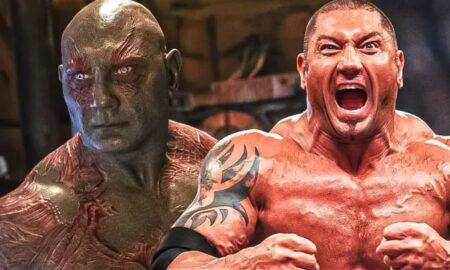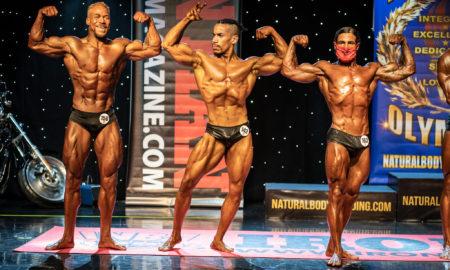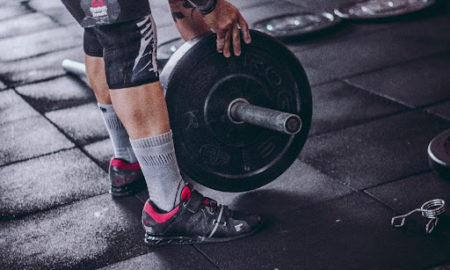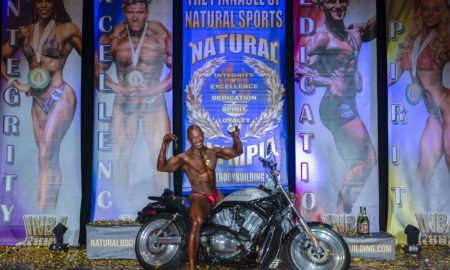In any area of life, the deadly trap of our own negative thoughts is always our most formidable obstacle. Countless self-help gurus, from Napoleon Hill to Anthony Robbins, have emphasized that the most important ingredient in achieving your goals is the powerful belief that you can.
Human nature being what it is, however, the vast majority of us instead make excuses for why we can’t fulfill our dreams. Rather than take responsibility for our own destiny, we choose to blame everything from fate to other people for keeping us down.
It’s no different in bodybuilding. As much as we all profess the desire to craft our physiques into something truly exceptional, we all have excuses for why we can’t. Rather than implore you to shout down the negative voices in your head and drown them out with passionate positivity, let’s do something a lot more practical that requires far less mental effort. I’ve listed the 10 most common negative beliefs below. They are the excuses most of us wield against any who would question our lack of progress in achieving our physique goals. Yet each one, like the famous dark cloud, has a silver lining. Each of the so-called negatives actually becomes a positive—an alleged disadvantage turned into an advantage—if you merely think about it another way.
Negative 1: “I don’t have perfect genetics.”
First off, who does? Run through the names of the men considered to have the most gifted genetics in bodybuilding, and you’ll note that they all have or had flaws. Flex Wheeler and Phil Heath both have narrow clavicles. Arnold’s triceps were never as good as his biceps, and neither Lee Haney nor Dorian Yates had arms that completely matched the rest of their massive bodies. Dexter Jackson and Dennis Wolf have pretty high calves, and even Jay Cutler has a wide waist. But to be fair, any pro bodybuilder will have phenomenal genetics compared to the rest of us. At worst it means that you’ll probably never pose on the Mr. Olympia stage.
Why it’s a positive: Having less-than-optimal genetics also means that it will take you a whole lot of time and effort to build an outstanding physique. What’s great about that? For one thing, there’s nothing like a challenge to keep you motivated. I’ve known many, many guys and girls over the years who were lucky enough to be born with superb genetics for bodybuilding. Surprisingly, only a small percentage ever came close to fulfilling their potential. It all came too fast and easily for them, and there was zero challenge. They got bored and either quit training or settled for what they had after a couple years and never made any effort to improve beyond that. Meanwhile, I’ve witnessed far more bodybuilders who chose to make the most of what they had no matter how much work and time it was going to take, and they all made enormous improvements as the years went by. In many cases they built physiques so good that most people incorrectly assume that they, too, are “genetic freaks.”
Negative 2: “I don’t use performance-enhancing drugs.”
Virtually all top bodybuilders these days use drugs like steroids, human growth hormone, insulin and thyroid and asthma medications to get better and faster results. Steroids are powerful tools for building muscle not only more quickly than you would without them but in far greater quantity. Fat-burning drugs combined with a strict diet and cardio can peel away enough fat that the person resembles a walking anatomy chart. And at the very end, when it’s time to step onstage, diuretics can suck out the water and impart a freaky shrink-wrapped look so that every last muscle fiber and striation can be seen clear as day. Being natural, you don’t have any of these “secret weapons.” You’ll never look great without them.
Why it’s a positive: Where do I begin? All of these drugs are illegal in the USA and many other countries if you don’t have a valid prescription. People get in big trouble for buying, selling or even being in possession of steroids, and lately the federal government has been attacking the black-market steroid trade with fervor. Then there’s the expense. Such drugs aren’t cheap, and as the authorities make buying and selling increasingly difficult, the prices have gone even higher.
Another downside to steroids is the loss of gains once you come off, which I have personally experienced. Few things are as depressing as seeing your superhuman physique wither away day by day and losing both your strength and your sex drive. Most important, however, all of the drugs carry potentially serious health risks. An increasing number of bodybuilders have become seriously ill and even died in recent years, as the long-term effects of abusing the drugs are finally starting to show. Guys are dropping dead from heart attacks at alarmingly young ages, and thousands more have health issues with their hearts, livers and kidneys. So by staying natural, you’re staying out of legal trouble, saving money, keeping all the gains you work so hard for in the gym and staying healthy. Don’t tell me that’s not a good thing.
Negative 3: “I don’t gain weight easily.”
I’ve yet to meet a bodybuilder who was totally satisfied with the rate at which he or she was able to gain muscle, with the exception of raw beginners. And to be fair, there are people out there who qualify as genuine hardgainers. They train like madmen and eat copious amounts of good food yet still struggle for every ounce of muscle they put on. It can be quite frustrating, and it makes it tough to sustain motivation. It’s just not fair that you have to do so much to get so little in return.
Why it’s a positive: The flip side to the problems of being in this category is that, due to your having a higher-than-average metabolic rate, everything you gain is pure muscle. Chances are that you stay pretty lean without having to be overly strict with your diet, and you may not even have to do much in the way of cardio either. Big deal, you say. It is a big deal to the majority, who have to sacrifice all the yummy treats and do hour upon hour of mind-numbing cardio just to see their abs.
At the extreme other end of the spectrum are those bodybuilders who were genetically meant to be obese. They may have to subsist on zero carbs and do up to two hours of cardio every single day to see some definition. Yeah, they can pile on 10 or 20 pounds in a month if they want to, but most of it will be bodyfat. People in the street usually assume they are football players or wrestlers, not bodybuilders. Meanwhile, the guys with the fast metabolism display deep cuts in their abs and road map vascularity 24/7. Being that lean creates the illusion of far more mass than actually exists, and the ladies generally love the ripped look. So it will take you longer to put on size, but you’ll never have to worry about being a fat ass.
Negative 4: “I can’t just eat, train and sleep the way the pros do.”
Wah, wah, wah. Someone call a wambulance. It’s true that many professional bodybuilders have steady checks rolling in every month from supplement companies and magazines that enable them to focus on doing what they must to be the best. They can indeed sleep eight to 10 hours at night and take naps during the day too. Many of us are lucky if we get six hours of quality shut-eye. They can eat every meal exactly when they need to, while those of us with so-called real jobs may have to miss meals or make do with shakes and bars instead.
Pro bodybuilders can train whenever they want, while a lot of us have to either get up at an ungodly hour to hit the weights before work or deal with lagging energy levels and crowded gyms after punching out for the day. If only we had no responsibilities except working out and eating, we’d look so much better.
Why it’s a positive: What happens when a guy has plenty of free time on his hands? Some pros wisely use that opportunity to work on business ventures and investments. Jay Cutler is a prime example. Yet for some I won’t name, the devil indeed finds work for idle hands. They spend their time between workouts—or should I say waste their time—playing video games and getting high. Maybe that doesn’t sound too horrible to some of you, but what happens when you become a drug addict or the contracts dry up and there are no more checks coming to the mailbox? It sucks to be them, that’s what.
Being very busy and having a lot of responsibilities may seem like a curse to you, but it’s really a blessing. The fact that you arrange all your meals and workouts around a busy schedule shows that you have discipline, dedication and excellent time-management skills. Those not only translate to success in bodybuilding but will carry over to all other aspects of your life as well.
Negative 5: “My workout time is limited.”
You watch some of the training DVDs of the pros and get jealous because they do so many exercises and sets, hitting the muscles from every imaginable angle. Clearly, those guys are hitting the weights for a couple of hours at a time, and they often train twice a day, up to six days a week. That must be the best way to train, or else the pros wouldn’t look so awesome. Too bad you can only spare an hour, four times a week. You’ll never get huge because you don’t have enough time to train.
Why it’s a positive: As mentioned above, just about everyone you see in the training DVDs—and anybody who’s built a great physique training with such high frequency and volume—is a genetic freak and has the recovery-enhancing properties of steroids to thank for success achieved on such a schedule. The average bodybuilder would certainly get overtrained sooner or later trying to emulate a pro workout like that and eventually would start losing size and strength. We bodybuilders so often believe that more is better. When it comes to training, too much is not better. Having limited time prevents you from being your own worst enemy. You won’t be tempted to train far more than you need, and you’ll have adequate time to recover and grow between workouts.
Negative 6: “I’m not very strong compared to the top bodybuilders.”
We’ve all seen the DVDs of Ronnie Coleman as he deadlifts and squats 800 pounds, bench-presses 500 pounds for reps and handles weights that even top powerlifters would respect. Watch DVDs and read training articles about the pros, and they all make you feel like a weakling in comparison. You may even have a few guys at your own gym who blow you away in terms of strength—I know I do. And since a stronger muscle is a bigger muscle, you’ll just never get very big. Poor you.
Why it’s a positive: Just about every bodybuilder famed for his prodigious strength has paid the price in injuries. Dorian Yates tore a biceps, a triceps and a quadriceps during his six-year reign as Mr. Olympia. More recently, Branch Warren tore a triceps to go along with the biceps and triceps he tore a few years ago. Nearly all torn pecs happen while lifters are doing very heavy bench presses.
So the fact that you can only bench-press 250 instead of 500 pounds means your odds of snapping a tendon are reduced. Another fact to consider is that heavy weights lend themselves to ballistic form, also a risk factor for serious injuries. A more moderate rep speed and an emphasis on squeezing the muscle make your odds of getting hurt much lower. When your form is better, you’ll also stimulate the muscle more effectively for growth in the long run.
There are more ways to make a muscle grow than simply making it stronger. Remember, strong is a relative word. If you’re handling more weight now than you did before, you are stronger—regardless of how much weight the guy on the bench next to you has on the bar.
Negative 7: “I don’t train at a big, fancy gym with high-tech equipment.”
Many of the pros train at cavernous gyms that feature practically every piece of equipment imaginable. They have all the latest high-tech machines at their disposal and such a wide variety that their minds and muscles never have to get bored. Meanwhile, your crummy gym just has the basics: barbells and dumbbells, benches, a power rack and one lousy cable station. Maybe you have a few machines, but it’s hardly a large assortment. If only you trained at a better gym, you’d have a better physique!
Why it’s a positive: Nothing works like basic free weights—nothing. Take it from a guy who once was thoroughly convinced that only Nautilus machines would help me grow and free weights were obsolete garbage—a time in my life when I didn’t grow much despite being in my prime years to do so. When bodybuilders have access to a lot of cool, modern machines, they often can’t help but use them.
During the year I trained at Gold’s Gym in Venice, California, I was like a kid in a candy store. The problem was, machines on their own just aren’t that effective. Once you get away from squats, deadlifts, bench presses, military presses, chins, dips and rows and start substituting machines that work the same muscle groups, your progress slows way down and often grinds to a complete halt. Having to use a lot of free weights and basic compound movements is actually a huge advantage for anyone who wants to pack on a lot of dense, thick muscle. It’s one case where technological progress has not necessarily been an improvement over the older tools.
Negative 8: “I don’t have money for a lot of supplements and have to rely on food.”
Many top amateur and pro bodybuilders have contracts with major supplement companies and get all their products for free. Others can afford whatever they need. Their kitchen cabinets would make you think they’d robbed a GNC store, and they use just about every type of supplement known to man. Then there’s you. You can barely scrape up enough dough for a couple of cans of protein powder and some creatine every month. Instead, you have to do the best you can with nothing more than chicken, fish, ground beef, eggs, rice and potatoes. Too bad you don’t get your supplements for free or have an unlimited budget. Then you’d look amazing.
Why it’s a positive: As good as supplements are today, especially for those of us who can still remember the worthless crap that was available years ago, many bodybuilders have come to rely too much on them. Nothing—I repeat, nothing—is as important as a good diet of whole foods. Yet because we are often suckers for advertising, we mistakenly think that certain supplements can take the place of a good diet or of training hard and getting proper rest. If you slack off in those areas, no supplement in the world will make up for it. Maybe you would look a little better if you could use a wide array of supplements on top of your meals, but I guarantee that you’re still a few steps ahead of the many guys out there who use a lot of supplements but don’t eat right.
Negative 9: “I’m too young.”
It can be rough trying to be a bodybuilder when you’re a teenager. School and homework cut into the time you have to eat and train. You don’t have the money to buy your own groceries and supplements (unless you work after school, which means you have even less time), so you rely on the generosity of your parents. You may not have a car, so transportation to the gym is an issue, as is being able to afford the membership. You can’t wait to be older because then you’ll really get huge.
Why it’s a positive: It’s true that you usually don’t have as much control over your life in your adolescent years as you do as an adult, but you have two things going for you that older guys would kill for: natural testosterone and growth hormone levels that are through the roof and boundless energy. You also probably don’t have any responsibilities much more stressful than keeping your grades up. When you grow up, those hormone levels will start to drop quite a bit. You’ll get tired a lot more easily, and your responsibilities may include a very demanding job, stacks of bills, a high-maintenance significant other and/or a brat of your own to worry about. You’re only young once, as they say, so embrace it while you can. Those abundant hormones and your stress-free life won’t last forever.
Negative 10: “I’m too old.”
As a guy who’s now pushing 40, I hear this one from my peers all the time. I’m too old to make any more muscle gains. Bodybuilding is for the young guys. I should have started way back when! Now it’s just too late for me. Where’s that TV remote, anyway?
Why it’s a positive: Being more mature can be a boon for bodybuilders. You have more money to spend on gym memberships, food, supplements and instruction. You’re also a lot wiser and more patient than you were as a kid, and you’re far less likely to get hurt doing something stupid in the gym. Sure, you probably need to warm up and stretch more, but that’s a good thing. Young people often get hurt because they walked in off the street and tried to start lifting heavy right away. As far as diminishing hormone levels, that’s as easy to fix as your diminishing ability to maintain erections. If your doctor determines via blood testing that you are indeed low in testosterone, you can qualify for hormone-replacement therapy to bring you up to the normal range.
So you see, every dark cloud does have a silver lining. It all depends on how you look at things. With the right point of view, you can turn anything you think is holding you back from success into something that can actually help you move right to it.
Editor’s note: Ron Harris is the author of Real Bodybuilding: Muscle Truth From 25 Years in the Trenches, available at RonHarrisMuscle.com. IM
















You must be logged in to post a comment Login